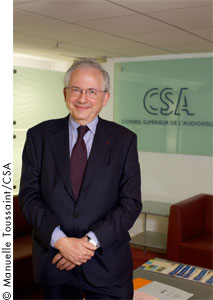|
 Foreword Foreword
The Conseil supérieur de l’audiovisuel's 2014 annual report is a reflection of how intense the year's various projects were. A key event in the year was the entry into force of the law of 15 November 2013, giving the Conseil new responsibilities, and enhancing its independence.
Economic regulation of the audiovisual industry was the primary area where these new charges were performed. Actions taken under the Conseil's enhanced airwave management power were based on prior impact studies carried out, e.g., following a request by pay TV channels to change their business models, or ahead of invitations for applications (appels à candidatures) for radio services. Studies were also conducted to assess the impact of licenses to use frequencies issued by the Conseil. They are detailed in a chapter of the report which is entirely devoted to them.
Public broadcasting is another area where the Conseil's restored and modernised charges were performed, with the appointment of Radio France's Chair, and the four-yearly review of France Télévisions. As the Conseil is now also associated with the preparation and follow-up on national programme companies' contrats d'objectifs et de moyens (objectives and means legal agreements), we issued an opinion regarding Radio France's and France Médias Monde's performance under their respective agreements.
Beyond implementing new features introduced under the law of 15 November 2013, the Conseil was also active in three main areas of socio-cultural regulation: first, political pluralism, by monitoring European, regional, and local elections; second, cultural exception, as regulatory amendments to new content support are being considered, and new competition emerges in the on-demand audiovisual media services market; and, finally, equal rights, with the implementation, as part of a voluntary initiative on the part of both television channels and radio stations, of the broadcasting provisions in the law of 4 August 2014, in favour of true gender equality, diversity promotion, and combating all forms of discrimination.
Broadcasting's crucial role in social cohesion was, therefore, made evident. While that role is primary played by the national education system, in similar fashion to education, broadcasting's role becomes even more crucial, when society may be targeted in its very foundations, and runs the risk of becoming sectarian and destabilised; it is about rejecting discrimination of any kind, and ensuring freedom of speech.
In the wake of the recent terrorist attacks against France, Denmark, and Tunisia, it is more than ever clear that audiovisual communication can serve as a beacon to illustrate the values that bring us together. In addition to being where the public naturally turns to for information, audiovisual communication also provides access to all forms of expression, new content, and culture.
As the business model of audiovisual media and their echo in society are thoroughly changed by digital technology, the Conseil supérieur de l'audiovisuel is keen to promote public broadcasting's independence and achievements, as well as the ebullience and plurality of private editors, and the wealth and spread of new content.
The Conseil is deeply aware of how instrumental dialogue at the European level is in this perspective. We actively prepared and supported creation in February 2014 of the 28-strong network of European regulators of audiovisual media services, now known under the acronym of ERGA; members will meet in Paris this April, under the chairmanship of the French CSA. For the Conseil and its renewed Board as of January last, this is one of the most important events of 2015.
As the terms of office of Françoise Laborde, Christine Kelly, and Emmanuel Gabla expired, we paid tribute to the work they performed on the many and diverse issues with which they were charged over the last six years. To succeed them, the Speakers of the Sénat and Assemblée nationale appointed Nicolas Curien and Nathalie Sonnac, following a favourable opinion by the parliamentary committees in charge of cultural matters. We welcome the arrival of these highly experienced professionals in the areas of media technology and ecnomics.
With now eight members, the Conseil'sBoard work has been restructured and streamlined. It is supported by skilled staff, at both the headquarters in Paris and the comités territoriaux—theregional committees enhancing broadcasting across France's diverse territories. By essence collective, the Conseil's work benefits from its staff's collective involvement, as evidenced by this report. It is my pleasure to use this opportunity to pay special tribute to the involvement of all them.
Olivier Schrameck
Chairman

|